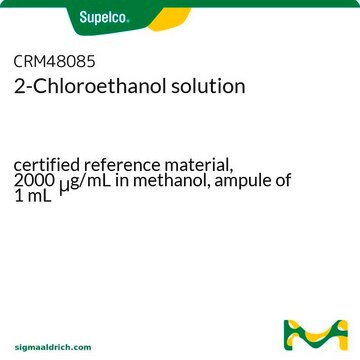185744
2-Chloroethanol
99%
Synonym(s):
Ethylene chlorohydrin
About This Item
Recommended Products
vapor density
2.78 (vs air)
Quality Level
vapor pressure
5 mmHg ( 20 °C)
Assay
99%
form
liquid
autoignition temp.
797 °F
expl. lim.
16 %
refractive index
n20/D 1.441 (lit.)
bp
129 °C (lit.)
mp
−89 °C (lit.)
solubility
alcohol: miscible
water: miscible
density
1.201 g/mL at 25 °C (lit.)
functional group
chloro
hydroxyl
SMILES string
OCCCl
InChI
1S/C2H5ClO/c3-1-2-4/h4H,1-2H2
InChI key
SZIFAVKTNFCBPC-UHFFFAOYSA-N
Looking for similar products? Visit Product Comparison Guide
Related Categories
General description
Application
Signal Word
Danger
Hazard Statements
Precautionary Statements
Hazard Classifications
Acute Tox. 1 Dermal - Acute Tox. 1 Inhalation - Acute Tox. 2 Oral - Aquatic Chronic 2 - Eye Dam. 1 - Flam. Liq. 3 - Met. Corr. 1
Storage Class Code
3 - Flammable liquids
WGK
WGK 3
Flash Point(F)
131.0 °F - closed cup
Flash Point(C)
55 °C - closed cup
Personal Protective Equipment
Choose from one of the most recent versions:
Already Own This Product?
Find documentation for the products that you have recently purchased in the Document Library.
Customers Also Viewed
Our team of scientists has experience in all areas of research including Life Science, Material Science, Chemical Synthesis, Chromatography, Analytical and many others.
Contact Technical Service













